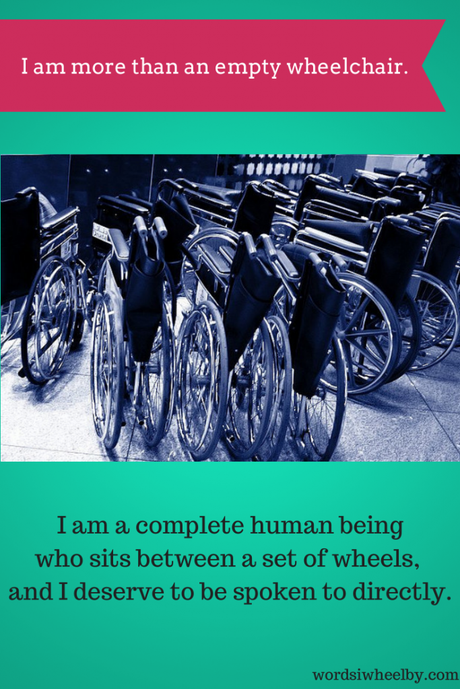First visit? Glad you're here! I hope you'll take a second to "Like" my page on Facebook and subscribe for updates so we can stay connected!
When you want to address a person, the natural next step should be to speak directly to that person, right? This kind of conversational exchange is the way of the world. So, if you’re saying something intended for a person who is right in front of you, but you convey your message to that person by looking at and speaking to a person next to them, then you’d look pretty silly. This makes me wonder: why is it acceptable for people to address someone else about something directed toward me just because I’m in a wheelchair, when you’d never do this to a person who doesn’t appear disabled? My wheelchair is all too often perceived as a symbol that I’m incapable of processing what a person says to me, and it’s time for the world to wake up and realize this isn’t true.
But, it’s also time for me to start confronting these issues head on when they happen, rather than waiting until after the fact when I can put fingers to the keyboard and write about what I should have said in response. Unfortunately, an opportunity to put my money where my mouth is recently presented itself while I was at a disability-themed event, of all places.
A group of friends and I (all with disabilities) went on an adventure to see a screening of a documentary called Cinemability at amazing film festival called Reelabilities, held in New York City. With the exception of one of us, we all use some form of mobility aid to get around. Of course, this meant we caused quite the traffic jam while waiting outside the auditorium before the film.
I figured we were in a safe space, one so full of people from the disability community that we wouldn’t be subjected to common ignorance. I was wrong…

“Can you move them over there?” It was such an innocent question. The woman volunteering as an usher looked at the only one in my group of friends who doesn’t use a wheelchair or a walker, hoping he would herd us, “them,” to the back of the lobby to get out of the way for other people using mobility aids. My friend doesn’t appear to have a physical disability when he’s just standing still, so the usher directed her request at him as though he was our chaperone. And while this simple, blatant ableism so often renders me speechless until I come up with the perfect reply in the middle of the night, I just wasn’t willing to sit there and take it that day.
After my friends and I got over the initial frustration, we debated if one of us should say something. Initially, I joked that the comment would make for a great blog post later on. But my reluctance to say something weighed heavily on my mind. If I really want to be an advocate, then I have to do more than advocate from behind a computer screen. So, with my heart racing at the thought of confrontation, I pushed my way through the wheelchair traffic jam straight towards the woman.
I don’t recall exactly what I said, because nerves and anxiety kicked in, but it went something like: “Excuse me, when you told my friend to move ‘them’ over there before, I know you probably didn’t mean anything by it, but I just wanted to let you know for future reference that if your comment is towards someone disabled, you should speak directly to the person. This is especially important since you’re working a disability film festival for the next few days.” The woman looked at me like a deer in headlights and then said “Oh, uh, sorry, I didn’t know. I didn’t mean to.” And then someone else tried to get her attention, and she couldn’t have spun away from me any faster, acting completely engrossed in what the other person was saying.
As I rolled away, I felt a pang of guilt because I knew I had embarrassed the woman and put her on the spot. Then I realized this compulsion to be apologetic, as though displays of ableism are somehow my fault because I exist, just isn’t fair. By confronting ableism in a way that’s firm but polite, then maybe, just maybe, the person will think twice next time they’re in a similar situation.
Or, maybe they’ll go on with their lives and do the same thing again in the future. I’m realistic enough to realize it’ll take more than a response to an isolated instance of ableism – no, more than a million responses – to effect change in society. But I am more than an empty wheelchair; I am a complete human being who sits between a set of wheels, and I deserve to be spoken to directly. So I, for one, am making a promise to myself that I won’t be taking ableism sitting down. Well, at least metaphorically, that is!
Have you ever been bold enough to confront ableism? I’d love to know your story.
Photo credit: Irina Souiki / Foter / Creative Commons Attribution-NonCommercial-NoDerivs 2.0 Generic (CC BY-NC-ND 2.0)
Like what you read? Subscribe for weekly updates and be sure to confirm your e-mail!

